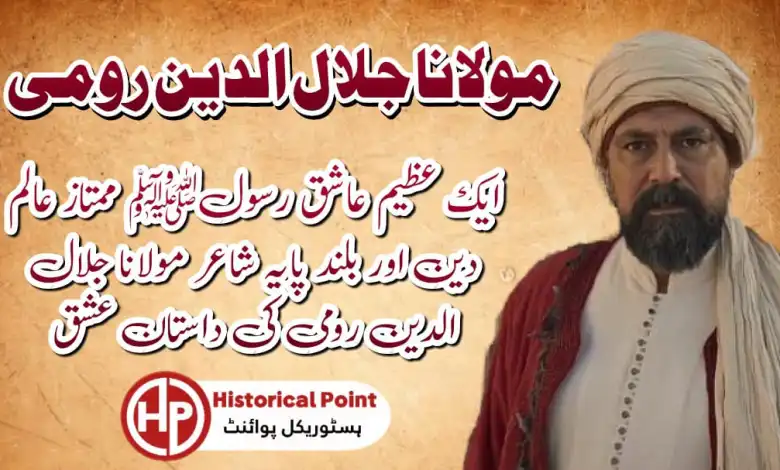Jalaluddin Rumi (February 14, 1207 – July 14, 1273) was a 13th-century Persian poet and Sufi mystic from Konya. His poetry is characterized by its use of imagery from traditional stories, by the repetition of certain key phrases and expressions, and by the use of vernacular language. He has been called “the greatest exponent of the Anatolian Sultanate style” in the last thousand years.
Maulana Jalaluddin Rumi was a 13th century poet, Sufi mystic and Muslim saint.
Jalaluddin Rumi was a 13th century poet, Sufi mystic and Muslim saint. He was born on February 14, 1207 in Balkh, Afghanistan. Rumi’s father was a wealthy landowner who died when he was fifteen years old. In response to his loss of family wealth and status as an orphaned young man with no prospects for marriage or employment opportunities, Rumi turned away from material values and devoted himself instead to religious scholarship while continuing his education at the local university of Balkh (now Afghanistan).
Rumi did not receive any formal training until he reached adulthood; however he quickly gained recognition as an intellectual among both Muslims and non-Muslims alike due to his remarkable talents in poetry writing as well as mystical thoughts about God’s presence on Earth through love (Bayazid Bastami).
Rumi was born on February 14, 1207 in Balkh, Afghanistan.
Jalauddin Rumi was born on February 14, 1207 in Balkh, Afghanistan. He is known as the “Marvellous City” or “Bismillah-ir-Rahman-ur Rahim” (in Arabic: بسم الله والرحمن الرحيم). His birthplace is still a holy place to Muslims today.
Rumi was born into a middle class family and his father died when he was young and his mother raised him by herself. She taught him how to read and write which helped him later become an accomplished poet himself who wrote many famous poems about love for God and other things such as Sufism etc..
Click Here to Watch Rumi Episode 5:
Server 1:
Rumi’s father was a professor of theology, and his mother was descended from the Mongol ruler Genghis Khan’s sister.
Rumi’s father taught at the same university as Jalauddin’s uncle, who was also a theologian.
Rumi grew up in Konya (modern-day Turkey), where he studied under his uncle until 1237 when he went to Damascus to study at Harran under Shams al-Din Muhammad Balkhi al-Khwansuri (died 1248).
Rumi spent most of his childhood and teenage years in his birthplace of Balkh.
Jalaluddin Rumi was born in 1207, in Balkh (in present-day Afghanistan). He spent most of his childhood and teenage years there. As a young man, he left for Konya (Turkey), where he studied under Sufi masters such as Shams Tabrizi and Fakhr al-Din Attar. After traveling for some time through various regions of Anatolia and Persia, Rumi eventually settled down at Konya University where he taught philosophy from 1247 until his death in 1273 at age 63
In 1221, he went to Konya in Anatolia to study under a scholar named Attar.
Rumi studied under Attar for three years. He visited Konya in Anatolia, where he lived and studied with the scholar. In 1221, he returned to Konya with his friend Shams of Tabriz (also known as Shams-e Tabrizi).
His mystical poem Masnavi was written between 1226 and 1231 when he visited Baghdad with his teacher Shams-i Tabrizi (1203 – 1291).
Rumi was born in 1207 and spent most of his childhood and teenage years in his birthplace of Balkh. He went to Konya in Anatolia to study under a scholar named Attar, who introduced him to the mystical teachings of Sufism. In 1221, he began teaching at the Sama’at al-Numan mosque where he became known as “the Master” or “the Poet.” After Shams-i Tabrizi died (1291), Rumi moved away from Konya and settled down with his mother at Kayseri until she died three years later; then he returned home for burial.
In 1235 he travelled to Syria to visit his grandfather’s grave.
In 1235 he travelled to Syria to visit his grandfather’s grave. He also visited many other places and met many famous Sufi masters, including Hasan of Basra and Rumi’s teacher, Nizam al-Mulk.
He wrote two great works: the Masnavi (The Book of Questions) and Mathnawi (The Mathnavi). The Masnavi contains poems about philosophy and love that were probably written before Rumi left for Syria; they are more religious than philosophical in nature because they deal with God as if he were a human being who can be loved by humans like any other person on earth.
On his travels, he met many famous Sufi masters including Sheikh Sari Bahadur Wali Hazrat Mawlana Nizamuddin Auliya (died 1305), Qutb al-Din Bakhtiyar Khilji (died 1308) and Sultan Walad (1184 – 1248).
After the death of his father, Jalauddin Rumi went on a pilgrimage to Mecca. On his travels, he met many famous Sufi masters including Sheikh Sari Bahadur Wali Hazrat Mawlana Nizamuddin Auliya (died 1305), Qutb al-Din Bakhtiyar Khilji (died 1308) and Sultan Walad (1184 – 1248).
During this time he also met with his brother Ibrahim who had become a follower of Shaikh Abdul Qadir Jilani around 1223 AD.
Jalaluddin Rumi is an important part of Persian literature and spirituality
Jalaluddin Rumi is an important part of Persian literature and spirituality. He was born in Balkh, Afghanistan on February 14, 1207 to Umar Khayyam and Toghra Begam. His father Umar was a professor at the College of Nizamiyah, where he taught astronomy and chemistry until his death when Jalaluddin was five years old.
His mother Toghra Begam came from a family that had been prosperous merchants in Herat before they moved to Persia during which time she became fluent in Arabic and Persian languages as well as learning Turkish language with her husband who served as ambassador between Caliph Al-Mustansir (1201–1220) and Mongol ruler Genghis Khan (1162–1227).
Conclusion
Jalaluddin Rumi is an important part of Persian literature and spirituality. His teachings have been spread around the world by Muslims, Christians and Jews alike.




